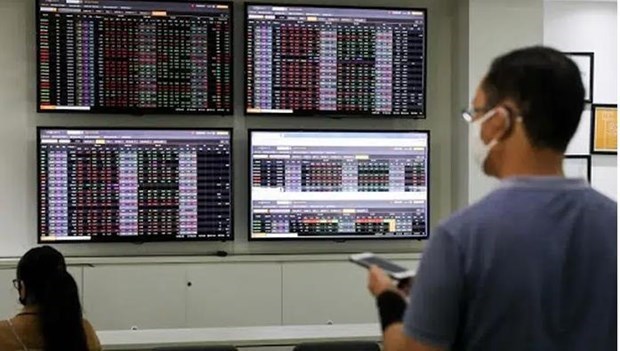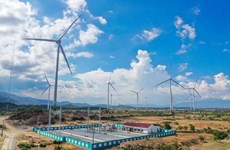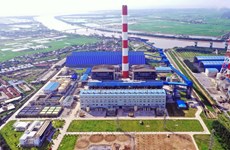Vietnam’s securities market makes great strides
 Illustrative image (Photo: VNA)
Illustrative image (Photo: VNA)
Hanoi (VNA) - The Vietnamese securities market recently set a record with 1 billion USD worth of daily transactions, putting it at the second place in terms of market liquidity in Southeast Asia.
The UK's Proactiveinvestors website said on June 15 that Vietnam's stock market is making the expected progress from frontier status to a fully-fledged emerging market.
Cash flow "flooded" into the stock market in May and the first sessions of June helped the VN-Index continuously "crush" the previous records. New account openings and market liquidity both hit all-time high.
Experts said the securities market is still a "low-lying area" to attract cash flow in the near future.
According to the State Securities Commission (SSC), the average trading value on the stock market has reached over 21.2 trillion VND (921 million USD) per session since the beginning of the year, up 185.9 percent compared to the average in 2020.
As of late May, the stock market capitalisation reached over 6.44 quadrillion VND, up 21.7 percent from late 2020, equivalent to 102.3 percent of the country’s gross domestic product.
SSC Vice Chairman Pham Hong Son said the growth of the market proves its mid and long-term capital mobilisation role and a “barometer” of the Vietnamese economy in general and the attractiveness of the market in particular.
With an average economic growth of 7 percent over the past six years, Vietnam is expected to continue to be one of the fastest-growing economies globally.
Foreign investment and the guiding presence of institutions such as Dragon are a key element of the country’s growth, with investors attracted by positive similarities to China.
Proactive quoted founder and Executive Chairman of the Dragon Capital Dominic Scriven as saying that Vietnam's equity market is relatively immature and Vietnam's economy still offers significant opportunities to catch up with other rivals in the region.
Around 95 percent of the daily transaction volume on the Vietnamese stock market volume belongs to private investors, not institutions. There are very few institutional investors in the country and the biggest investor remains the Government, he said.
With the longest record of presence on the market compared to any independent asset manager in the country and the second biggest investor behind the government, Dragon Capital is first on the list for overseas investors in Vietnam.
Dragon is best known to UK investors as manager of the FTSE 250-listed Vietnam Enterprise Investments Ltd (LON:VEIL) investment trust, but it also runs an open-ended UCITS fund.
Scriven said “When we started, Vietnam's biggest export was scrap metal, and exports were 2 billion USD. After years in between where it emerged as one of the biggest agricultural exporters – of rice, of cashew nuts, of cinnamon, and several others – this year’s exports will be close on 300 billion USD and the biggest chunk of exports will be electronics and smartphones.”
“And what's guides that is a political system, political philosophy and a social structure that all combined to underlie consistency and stability,” he was cited by the article as saying.
“Vietnam is becoming more of a known quantity and its scope is spreading a bit more,” says Scriven.
“If you look at the real economy, it’s not a stretch to say Vietnam is the next manufacturing powerhouse after southern China and trade is booming”.
According to him, the market is maturing, it is no longer completely illiquid, there are 1,500 companies listed, it’s at nearly 250 billion USD of value and turning over a billion a day.
“It is sizable and it is touching on becoming an accepted emerging market and over the next five years, I believe we will broach the individual investor market as people open their eyes to what’s going on here,” he said.
With assets under management totalling around 5.5 billion USD, of which the VEIL trust is approximately 40 percent and the ETFs just under 20 percent, Dragon Capital is one of the biggest players in Southeast Asia./.












